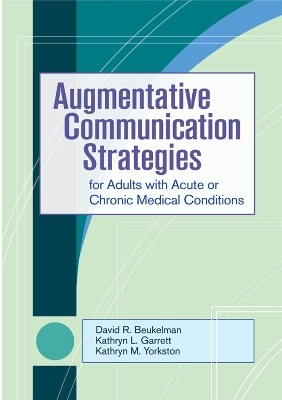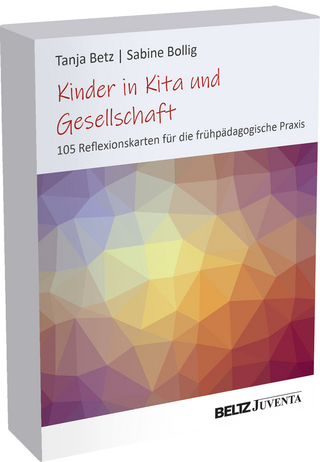
Augmentative Communication Strategies for Adults with Acute or Chronic Medical Conditions
Brookes Publishing Co
978-1-55766-875-2 (ISBN)
- Titel z.Zt. nicht lieferbar
- Versandkostenfrei
- Auch auf Rechnung
- Artikel merken
This is a guide to aid clinicians who provide AAC interventions for adults with acquired communication disabilities. Covering a wide range of communication disabilities and disorders caused by injury and illness, the book offers up-to-date AAC intervention strategies and procedures in medical settings. A practical resource for clinicians on AAC intervention in medical settings, this book provides information that is understandable and useful to clinicians who do not specialize in AAC. Chapters discuss providing AAC services to people who have chronic and acute medical conditions that affect their communication as well as specific disorders and illnesses, including brainstem impairments, spinal cord injury, traumatic brain injury, severe aphasia, primary progressive aphasia, dementia, and amyotrophic lateral sclerosis (ALS), and how to build and maintain AAC teams. The book is mainly concerned with services for adult populations who use AAC.
David R. Beukelman, Ph.D is the Barkley Professor of Communication Disorders at the University of Nebraska-Lincoln, Director of Research and Education of the Communication Disorders Division, Munroe/Meyer Institute of Genetics and Rehabilitation at the University of Nebraska Medical Center, A research partner in the Rehabilitation Engineering and Research Center in Augmentative and Alternative Communication, and a senior researcher in the Institute for Rehabilitation Science and Engineering at the Madonna Rehabilitation Hospital. With Pat Mirenda, he co-authored the textbook, Augmentative and Alternative Communication: Management of Severe Communication Disorders in Children and Adults. He served as editor of the Augmentative and Alternative Communication Journal for four years. Dr. Garrett is currently a full-time clinician and director of an Augmentative Communication pediatric evaluation center at The Childrena (TM)s Institute in Pittsburgh, PA, where she works with children and young adults who have complex communication needs. She previously had full-time academic appointments at Duquesne University and the University of Nebraska, where she conducted clinical, research, and teaching activities in the areas of aphasia, brain injury, and AAC. Kathryn M. Yorkston, Ph.D., is Professor and Head of the Division of Speech Pathology in the Department of Rehabilitation Medicine at the University of Washington. Nancy B. Alarcon, M.S., CCC-SLP, BC-ANCDS, Senior Lecturer and Clinic Director, Department of Speech and Hearing Sciences, University of Washington, 1417 NE 42nd Street, Seattle, Washington 98105 Ms. Alarcon directs the outpatient teaching clinic at the University of Washington and supervises in the area of adult neurologic communication disorders. Her clinical work in this area with colleagues has focused on supported communication intervention in aphasia, the impact of group treatment in reducing social isolation, and long-term patient/family intervention in primary progressive aphasia. Laura J. Ball, Ph.D., is an associate professor in the Department of Communication Sciences and Disorders at East Carolina University. Dr. Ball completed her doctoral degree at the University of Nebraska with research interests in AAC and motor speech disorders. Dr. Ball has more than 25 years' clinical experience and is the author of numerous publications on topics related to AAC, dysarthria, and apraxia. Michelle S. Bourgeois, Ph.D., CCC-SLP, is a professor in the Department of Communication Sciences and Disorders at the University of South Florida and a Fellow of the American Speech Language Hearing Association at Hunter College. A clinical researcher, she investigates interventions designed to improve the quality and quantity of cognitive-communication outcomes for persons with dementia, traumatic brain injury, or aphasia and their spouses and caregivers. Dr. Fager is the Director of the Communication Center in the Institute for Rehabilitation Science and Engineering. Dr. Fager specializes in assistive technology/augmentative communication for adults with acquired and degenerative neurologic conditions such as traumatic brain injury, spinal cord injury, stroke, amyotrophic lateral sclerosis (ALS), multiple sclerosis, and Parkinsona (TM)s disease. Her research has focused on the evaluation of new and emerging assistive technologies for individuals with severe physical impairments. A speech-language pathologist at work, Melanie wears three hats: Director of the Assistive Technology Program at the Child Development and Rehabilitation Center; Principal Investigator on a University Affiliated Program training grant entitled OTTR (Oregon Technology Training and Resources); and Clinician and Director of the Augmentative Communication Clinic in the Department of Neurology. She has been involved in the field of augmentative and alternative communication since 1979 (when it was still called nonvocal or argumentative communication!). Outside of the office, Melanie wears more than three hats: She is mother of Kiva, Adam, and Corey; partner to Barry; and organizer for all of the hiking, camping, traveling, and adventures that the family takes together. Dr. Lasker has published numerous papers and chapters related to assessment and treatment of adults living with acquired neurogenic disorders who may benefit from AAC. Her research has explored issues pertaining to AAC assessment protocols, context-based intervention, partner training, and the acceptance of AAC approaches by adults with severe communication disorders and their communication partners. She has presented nationally and internationally on these topics.
| Erscheint lt. Verlag | 30.10.2007 |
|---|---|
| Zusatzinfo | Contains Paperback and CD-ROM |
| Verlagsort | Baltimore |
| Sprache | englisch |
| Maße | 181 x 251 mm |
| Gewicht | 786 g |
| Themenwelt | Medizin / Pharmazie ► Gesundheitswesen |
| Sozialwissenschaften ► Pädagogik ► Sozialpädagogik | |
| Sozialwissenschaften ► Soziologie | |
| ISBN-10 | 1-55766-875-2 / 1557668752 |
| ISBN-13 | 978-1-55766-875-2 / 9781557668752 |
| Zustand | Neuware |
| Haben Sie eine Frage zum Produkt? |
aus dem Bereich


